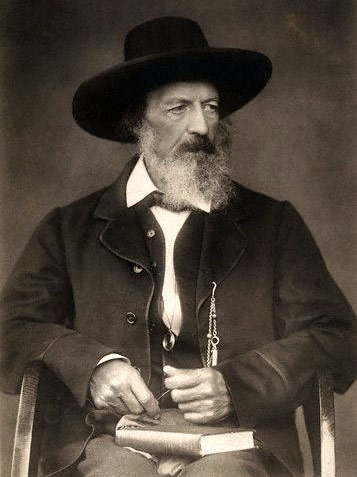Tennyson, Alfred Lord oldala, Angol életrajz
Életrajz
[Angol] [Magyar]
(1809-1892)
Writing his first poetry at the age of 8, Alfred Tennyson was able to compose a 6,000 line epic in imitation of Sir Walter Scott by the age of 12 (Levi; Tennyson, Alfred Lord). Continuing his education in 1827 by attending Cambridge University, Tennyson joined a discussion group called the Apostles in 1829 (Tennyson, Alfred Lord). During a time of intellectual and political turmoil in England, with the institutions of church and state being challenged, the Apostles debated issues which led to the Reform Bill in 1832. A fellow participant in the Apostles, was one of Tennyson’s closest friends, Arthur Hallam (Tennyson, Alfred Lord).
Tragically, Hallam died in 1833, causing Tennyson to suffer from profound spiritual depression. Although he did not publish anything for 10 years after the death of his beloved friend, Tennyson became inspired to write In Memoriam (Alfred, Lord). It is possible that the death of Hallam inspired other poems, such as The Two Voices (1834), a philosophical poem about death and immortality (Alfred, Lord).
Seemingly absorbed in social issues, Tennyson’s poetry began as pure romantic escapism, and evolved into problems of religious faith, social change, and political power (Alfred, Lord). All the characteristic moods of his poetry, from brooding splendor to lyrical sweetness, are expressed with smooth technical mastery (Alfred, Lord). His skills did not go unrecognized; after repeated nominations, Tennyson finally accepted the position of poet laureate of Britain by Queen Victoria in 1850 (Alfred Tennyson). Thus, Tennyson continued to grow into one of the most “notable poets of the Victorian Age” (Alfred, Lord).
With such remarkable skill, Tennyson continued to write easily understandable and enjoyable poetry that conformed to popular taste, with works such as Idylls of the King (1959-1885), Maud (1855), The Princess (1847), and An Ode on the Death of the Duke of Wellington (1852) (Alfred, Lord; Tennyson and Victorianism). As characterized by these works and many others, Tennyson is recognized as a “great poet, notable for his mastery of technique, his superb use of sensuous language, and his profundity of thought” (Tennyson, Alfred Tennyson).
Among other achievements during his life, Tennyson was created a peer to occupy a seat in the House of Lords, in 1883. In fact, historians agree that “[t]hroughout much of his life he was a popular as well as critical success and was venerated by the general public (Tennyson, Alfred Tennyson).
Later in his life, Tennyson turned his talents to plays: “Tennyson had a long and immensely productive literary career, and a chronology shows that he did ambitious work until late in his life. In his 60s he wrote a series of historical verse plays--Queen Mary (1875), Harold (1876), and Becket (1879)--on the "making of England." The plays were intended to revive a sense of national grandeur and to remind the English of their liberation from Roman Catholicism.” (Tennyson, Alfred Lord)
Alfred, Lord Tennyson died peacefully in 1892 with his family by his side. He requested that his poem, “Crossing the Bar,” always be printed last in any collection of his works (Levi). He was buried in Westminster Abbey (Tennyson, Alfred Lord)
Sarah Bowman



